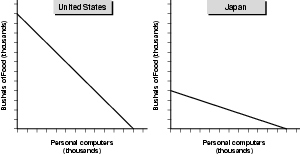International Trade: Exports, Imports—Why Bother?
Exports, Imports—Why Bother?
The fundamental reason for foreign trade is quite simple: Some nations are better at producing certain things than others. This means that they will all be economically better off if they specialize in what they do best and exchange a portion of what they produce for the goods of other nations who also specialize in what they do best.
In a way, the rationale for international trade follows the same line of logic that caused a worker in a medieval village to specialize in butchering or baking or candlestick making, and then exchange her goods with other specialists. International trade works the same way, only on a larger scale.
To illustrate this, let's suppose that there are only two countries on the planet—the United States and Japan—and they make only two products: food and personal computers. The following two tables show the production possibilities, per week, for each nation.
| Possibility | Bushels of Food | Personal Computers |
|---|---|---|
| A | 0 | 12 |
| B | 3 | 9 |
| C | 6 | 6 |
| D | 9 | 3 |
| E | 12 | 0 |
| Possibility | Bushels of Food | Personal Computers |
|---|---|---|
| A | 0 | 12 |
| B | 1 | 9 |
| C | 2 | 6 |
| D | 3 | 3 |
| E | 4 | 0 |
Figure 17.1 shows the production possibility functions of each nation. It is simply the graphic representation of the values in Tables 17.1 and 17.2.

Each nation can produce the same number of personal computers in a week. But the United States can produce three times as much food as Japan. In other words, if each nation chose to produce only computers, they would each produce 12,000, but if each chose to produce only food, the United States would produce 12,000 bushels and Japan would produce only 4,000.
At first glance, it may seem as if the two nations—particularly the United States—have no reason to engage in foreign trade. After all, the United States is just as efficient at producing computers and three times as efficient at producing food. Why would the United States be interested in trade?
Here's where the notion of comparative advantage comes in. The United States can produce either food or computers at a one-to-one trade off. In other words, if the United States chooses to produce another personal computer, it must give up one bushel of food. That bushel of food is the United States' opportunity cost of producing another computer.
However, if Japan gives up one bushel of food, it can produce three personal computers. The opportunity cost of producing personal computers in Japan is only one-third what it is in the United States. Japan sacrifices less food than the United States would in order to increase its production of personal computers.
The nation with the lower opportunity cost in producing a good has a comparative advantage in the production of that product. In this case, Japan has a lower opportunity cost than the United States in producing computers. The U.S. has what economists call an absolute advantage in producing food. The U.S. can produce 12,000 bushels of food per week while Japan can produce only 4,000. But absolute advantage doesn't necessarily indicate that a nation should export that product. That's because the nation might have to give up producing some of a product in which it has an even greater absolute advantage.
EconoTalk
Comparative advantage arises for a nation when its opportunity cost of producing a good is lower than that of another nation. Absolute advantage arises when a nation can produce a good more cheaply than another nation. Comparative advantage, not absolute advantage, indicates which good a nation should export or import.
The British economist David Ricardo (1772-1823) developed the concept of comparative advantage to answer the question, “Which nation should specialize in producing which good?” He found that the nation having a lower opportunity cost than other nations in producing a product should specialize in that product, and called that the principle of comparative advantage.
So in this example, even though the United States has the absolute advantage in producing food, and is equally efficient at producing personal computers, Japan has a comparative advantage in producing personal computers. However, the United States also has a comparative advantage relative to Japan—in food.
Why? Because the United States only has to give up one personal computer to produce an additional bushel of food, while Japan must give up three computers. The United States faces a lower opportunity cost than Japan when it chooses to produce food instead of computers. That means that the United States should produce food, and exchange it with Japan for computers.
So, in our example and in theory, the United States would produce only food, Japan would produce only personal computers, and they would each exchange some of their production with one another.
Excerpted from The Complete Idiot's Guide to Economics © 2003 by Tom Gorman. All rights reserved including the right of reproduction in whole or in part in any form. Used by arrangement with Alpha Books, a member of Penguin Group (USA) Inc.
To order this book direct from the publisher, visit the Penguin USA website or call 1-800-253-6476. You can also purchase this book at Amazon.com and Barnes & Noble.







